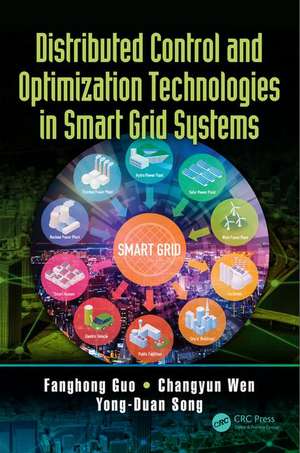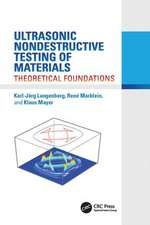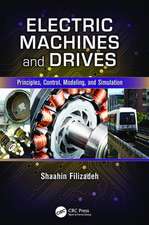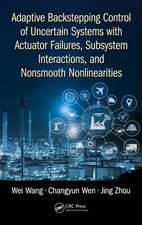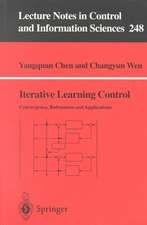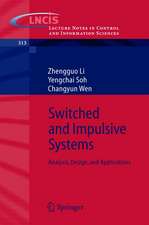Distributed Control and Optimization Technologies in Smart Grid Systems: Microgrids and Active Power Distribution Networks
Autor Fanghong Guo, Changyun Wen, Yong-Duan Songen Limba Engleză Hardback – 20 dec 2017
Preț: 1102.54 lei
Preț vechi: 1344.57 lei
-18% Nou
Puncte Express: 1654
Preț estimativ în valută:
211.16€ • 217.55$ • 176.88£
211.16€ • 217.55$ • 176.88£
Carte tipărită la comandă
Livrare economică 24 februarie-10 martie
Preluare comenzi: 021 569.72.76
Specificații
ISBN-13: 9781138088597
ISBN-10: 1138088595
Pagini: 214
Ilustrații: 59 Line drawings, color; 12 Line drawings, black and white; 2 Halftones, color; 18 Tables, black and white
Dimensiuni: 156 x 234 x 14 mm
Greutate: 0.5 kg
Ediția:1
Editura: CRC Press
Colecția CRC Press
Seria Microgrids and Active Power Distribution Networks
ISBN-10: 1138088595
Pagini: 214
Ilustrații: 59 Line drawings, color; 12 Line drawings, black and white; 2 Halftones, color; 18 Tables, black and white
Dimensiuni: 156 x 234 x 14 mm
Greutate: 0.5 kg
Ediția:1
Editura: CRC Press
Colecția CRC Press
Seria Microgrids and Active Power Distribution Networks
Cuprins
Preface. Introduction. Preliminaries. Distributed Voltage and Frequency Restoration Control. Distributed Voltage Unbalance Compensation. Distributed Single-Area Economic Dispatch. Distributed Multi-Area Economic Dispatch. Hierarchical Decentralized Architecture for ED Problem. Distributed Optimal Energy Scheduling. Conclusion and Future Works. Index.
Notă biografică
Fanghong Guo received his B. Eng. degree in Automation Science from Southeast University, Nanjing, China in July 2010, M. Eng. degree in Automation Science & Electrical Engineering from Beihang University, Beijing, China in January 2013, and Ph.D. degree in Sustainable Earth from Energy Research Institute @NTU, Interdisciplinary Graduate School, Nanyang Technological University, Singapore in November 2016. He is currently a Scientist in the Experimental Power Grid Center (EPGC), Agency for Science, technology and Research, Singapore. His research interests include distributed cooperative control, distributed optimization on microgrid systems, and smart grid. He received "the 2015 National Award for Outstanding Self-financed Chinese Students Study Abroad" in 2015.
Changyun Wen received the B.Eng. degree from Xi’an Jiaotong University, Xi’an, China, in 1983 and the Ph.D. degree from the University of Newcastle, Newcastle, Australia in 1990. From August 1989 to August 1991, he was a Research Associate and then Postdoctoral Fellow at University of Adelaide, Adelaide, Australia. Since August 1991, he has been with School of Electrical and Electronic Engineering, Nanyang Technological University, Singapore, where he is currently a Full Professor. His main research activities are in the areas of control systems and applications, autonomous robotic system, intelligent power management system, smart grids, cyber-physical systems, complex systems and networks, model based online learning and system identification, signal and image processing.
Dr. Wen is an Associate Editor of a number of journals including Automatica, IEEE Transactions on Industrial Electronics and IEEE Control Systems Magazine. He is the Executive Editor-in-Chief of Journal of Control and Decision. He served the IEEE Transactions on Automatic Control as an Associate Editor from January 2000 to December 2002. He has been actively involved in organizing international conferences playing the roles of General Chair, General Co-Chair, Technical Program Committee Chair, Program Committee Member, General Advisor, Publicity Chair and so on. He received the IES Prestigious Engineering Achievement Award 2005 from the Institution of Engineers, Singapore (IES) in 2005. He received the Best Paper Award of IEEE Transactions on Industrial Electronics, in 2017. He is a Fellow of IEEE, was a member of IEEE Fellow Committee from January 2011 to December 2013 and a Distinguished Lecturer of IEEE Control Systems Society from February 2010 to February 2013.
Yong-Duan Song received his Ph.D. degree in electrical and computer engineering from Tennessee Technological University, Cookeville, USA, in 1992. He held a tenured Full Professor position with North Carolina A&T State University, Greensboro, from 1993 to 2008 and a Langley Distinguished Professor position with the National Institute of Aerospace, Hampton, VA, from 2005 to 2008. He is now the Dean of School of Automation, Chongqing University, and the Founding Director of the Institute of Smart Engineering, Chongqing University. He was one of the six Langley Distinguished Professors with the National Institute of Aerospace (NIA), Founding Director of Cooperative Systems at NIA. He has been serving as an Associate Editor/Guest Editor for several prestigious scientific journals, including IEEE Transactions on Automatic Control, IEEE Transactions on Neural Networks and Learning Systems, IEEE Transactions on Intelligent Transportation Systems, etc. His research interests extend to intelligent systems, guidance navigation and control, bio-inspired adaptive and cooperative systems, rail traffic control and safety, and smart grid.
Changyun Wen received the B.Eng. degree from Xi’an Jiaotong University, Xi’an, China, in 1983 and the Ph.D. degree from the University of Newcastle, Newcastle, Australia in 1990. From August 1989 to August 1991, he was a Research Associate and then Postdoctoral Fellow at University of Adelaide, Adelaide, Australia. Since August 1991, he has been with School of Electrical and Electronic Engineering, Nanyang Technological University, Singapore, where he is currently a Full Professor. His main research activities are in the areas of control systems and applications, autonomous robotic system, intelligent power management system, smart grids, cyber-physical systems, complex systems and networks, model based online learning and system identification, signal and image processing.
Dr. Wen is an Associate Editor of a number of journals including Automatica, IEEE Transactions on Industrial Electronics and IEEE Control Systems Magazine. He is the Executive Editor-in-Chief of Journal of Control and Decision. He served the IEEE Transactions on Automatic Control as an Associate Editor from January 2000 to December 2002. He has been actively involved in organizing international conferences playing the roles of General Chair, General Co-Chair, Technical Program Committee Chair, Program Committee Member, General Advisor, Publicity Chair and so on. He received the IES Prestigious Engineering Achievement Award 2005 from the Institution of Engineers, Singapore (IES) in 2005. He received the Best Paper Award of IEEE Transactions on Industrial Electronics, in 2017. He is a Fellow of IEEE, was a member of IEEE Fellow Committee from January 2011 to December 2013 and a Distinguished Lecturer of IEEE Control Systems Society from February 2010 to February 2013.
Yong-Duan Song received his Ph.D. degree in electrical and computer engineering from Tennessee Technological University, Cookeville, USA, in 1992. He held a tenured Full Professor position with North Carolina A&T State University, Greensboro, from 1993 to 2008 and a Langley Distinguished Professor position with the National Institute of Aerospace, Hampton, VA, from 2005 to 2008. He is now the Dean of School of Automation, Chongqing University, and the Founding Director of the Institute of Smart Engineering, Chongqing University. He was one of the six Langley Distinguished Professors with the National Institute of Aerospace (NIA), Founding Director of Cooperative Systems at NIA. He has been serving as an Associate Editor/Guest Editor for several prestigious scientific journals, including IEEE Transactions on Automatic Control, IEEE Transactions on Neural Networks and Learning Systems, IEEE Transactions on Intelligent Transportation Systems, etc. His research interests extend to intelligent systems, guidance navigation and control, bio-inspired adaptive and cooperative systems, rail traffic control and safety, and smart grid.
Recenzii
This book provides a nice bridge between pure control theory and practical implementation of various control strategies for MG's. It gives very good technical depth and illustrates the theory being implemented to provide the reader not only familiar with control theory, but those working with MG's in general, with an accessible book on MG controls that ties control theory together with physical , implementations making this book worthwhile reading not only for MG software developers, but for MG developers in general.
-IEEE Electrical Insulation Magazine
-IEEE Electrical Insulation Magazine
Descriere
The book aims to equalize the theoretical involvement with industrial practicality by reducing the mathematical difficulties. It provides an overview of distributed control and distributed optimization theory, followed by specific details on industrial applications to smart grid systems, with a special focus on micro grid systems.
